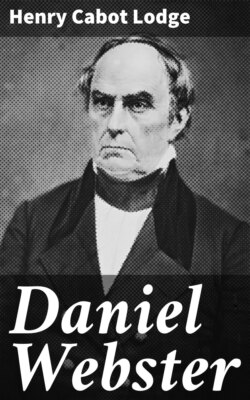Daniel Webster

Реклама. ООО «ЛитРес», ИНН: 7719571260.
Оглавление
Henry Cabot Lodge. Daniel Webster
Daniel Webster
Table of Contents
CHAPTER I. CHILDHOOD AND YOUTH. CHAPTER II. LAW AND POLITICS IN NEW HAMPSHIRE. CHAPTER III. THE DARTMOUTH COLLEGE CASE.—MR. WEBSTER AS A LAWYER. CHAPTER IV. THE MASSACHUSETTS CONVENTION AND THE PLYMOUTH ORATION. CHAPTER V. RETURN TO CONGRESS. CHAPTER VI. THE TARIFF OF 1828 AND THE REPLY TO HAYNE. CHAPTER VII. THE STRUGGLE WITH JACKSON AND THE RISE OF THE WHIG PARTY. CHAPTER VIII. SECRETARY OF STATE.—THE ASHBURTON TREATY. CHAPTER IX. RETURN TO THE SENATE.—THE SEVENTH OF MARCH SPEECH. CHAPTER X. THE LAST YEARS. DANIEL WEBSTER
CHAPTER I
CHILDHOOD AND YOUTH
CHAPTER II
LAW AND POLITICS IN NEW HAMPSHIRE
CHAPTER III
THE DARTMOUTH COLLEGE CASE.—MR. WEBSTER AS A LAWYER
CHAPTER IV
THE MASSACHUSETTS CONVENTION AND THE PLYMOUTH ORATION
CHAPTER V
RETURN TO CONGRESS
CHAPTER VI
THE TARIFF OF 1828 AND THE REPLY TO HAYNE
CHAPTER VII
THE STRUGGLE WITH JACKSON AND THE RISE OF THE WHIG PARTY
CHAPTER VIII
SECRETARY OF STATE.—THE ASHBURTON TREATY
CHAPTER IX
RETURN TO THE SENATE.—THE SEVENTH OF MARCH SPEECH
CHAPTER X
THE LAST YEARS
INDEX
Отрывок из книги
Henry Cabot Lodge
Published by Good Press, 2019
.....
This miracle came through Ezekiel, who had been doing more for himself and his family than any one else, but who, after three years in college, was at the end of his resources, and had taken, in his turn, to keeping school. Daniel went to Boston, and there obtained a good private school for his brother. The salary thus earned by Ezekiel was not only sufficient for himself, but enabled Daniel to gratify the cherished wish of his heart, and come to the New England capital to conclude his professional studies.
The first thing to be done was to gain admittance to some good office. Mr. Webster was lucky enough to obtain an introduction to Mr. Gore, with whom, as with the rest of the world, that wonderful look and manner, apparent even then, through boyishness and rusticity, stood him in good stead. Mr. Gore questioned him, trusted him, and told him to hang up his hat, begin work as clerk at once, and write to New Hampshire for his credentials. The position thus obtained was one of fortune's best gifts to Mr. Webster. It not only gave him an opportunity for a wide study of the law under wise supervision, but it brought him into daily contact with a trained barrister and an experienced public man. Christopher Gore, one of the most eminent members of the Boston bar and a distinguished statesman, had just returned from England, whither he had been sent as one of the commissioners appointed under the Jay treaty. He was a fine type of the aristocratic Federalist leader, one of the most prominent of that little group which from the "headquarters of good principles" in Boston so long controlled the politics of Massachusetts. He was a scholar, gentleman, and man of the world, and his portrait shows us a refined, high-bred face, suggesting a French marquis of the eighteenth century rather than the son of a New England sea-captain. A few years later, Mr. Gore was chosen governor of Massachusetts, and defeated when a candidate for reëlection, largely, it is supposed, because he rode in a coach and four (to which rumor added outriders) whenever he went to his estate at Waltham. This mode of travel offended the sensibilities of his democratic constituents, but did not prevent his being subsequently chosen to the Senate of the United States, where he served a term with much distinction. The society of such a man was invaluable to Mr. Webster at this time. It taught him many things which he could have learned in no other way, and appealed to that strong taste for everything dignified and refined which was so marked a trait of his disposition and habits. He saw now the real possibilities which he had dreamed of in his native village; and while he studied law deeply and helped his brother with his school, he also studied men still more thoroughly and curiously. The professional associates and friends of Mr. Gore were the leaders of the Boston bar when it had many distinguished men whose names hold high places in the history of American law. Among them were Theophilus Parsons, Chief Justice of Massachusetts; Samuel Dexter, the ablest of them all, fresh from service in Congress and the Senate and as Secretary of the Treasury; Harrison Gray Otis, fluent and graceful as an orator; James Sullivan, and Daniel Davis, the Solicitor-General. All these and many more Mr. Webster saw and watched, and he has left in his diary discriminating sketches of Parsons and Dexter, whom he greatly admired, and of Sullivan, of whom he had a poor opinion professionally.
.....